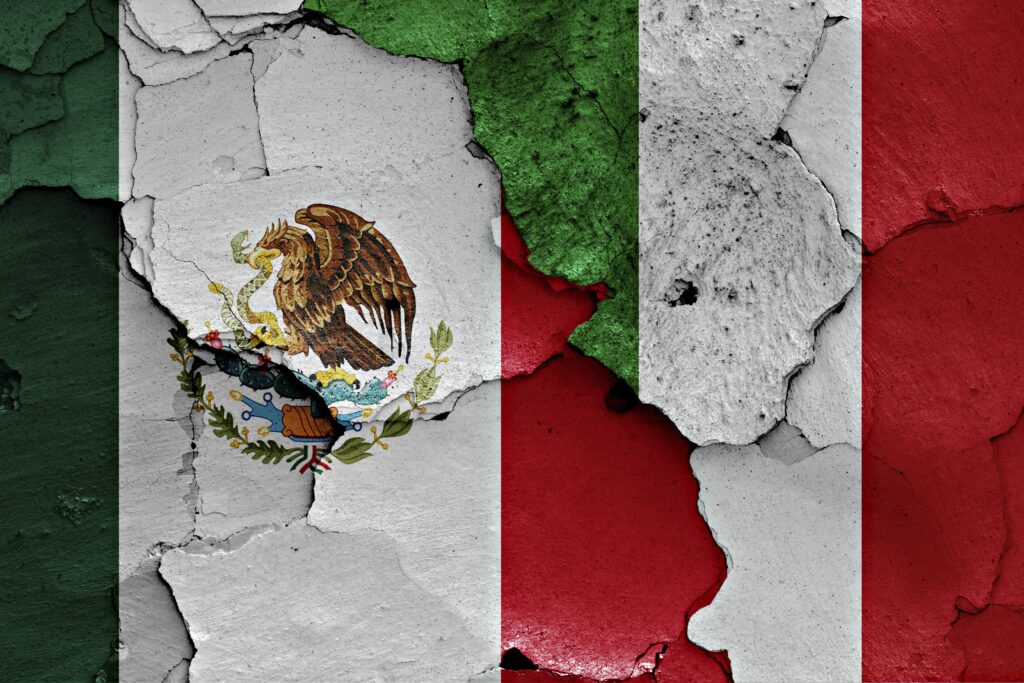06 Jun Chin Up: Mexico’s Deteriorating Separation of Powers and the Gathering Storm
By,
Jose Adan Gutierrez, Senior Fellow, MSI²
Pancho Villa allegedly used to say, “Ánimo muchachos, que más adelante está más feo” (‘Chin up, boys—things only get uglier from here’), a warning that seems fitting for Mexico’s current political and social trajectory.
I. Introduction: A Crisis Beneath the Surface
Mexico stands at the precipice of a new political era—one that evokes memories of its one-party past while raising the specter of even deeper instability. Though the Institutional Revolutionary Party (PRI) once ruled for seven decades, the current re-consolidation of power under the Morena party carries a far more perilous weight. Unlike the PRI era, this political centralization is unfolding amid a fragmented state, overwhelmed by cartel violence, economic uncertainty, weakened institutions, and the sharpening contours of global rivalry between the United States and China.
As outlined in my recent article, The Evolving War Against Mexican Cartels: Leadership, Government Involvement, and International Implications, Mexico’s democratic architecture is being tested not just by internal decay but by external forces eager to shape its future trajectory. This piece builds on those conclusions and explores how the erosion of the separation of powers, rising cartel dominance, elite flight, and geopolitical entanglement threaten to transform Mexico from a fragile democracy into a contested space of criminal and international power.
II. Return of One-Party Rule: A Dangerous Consolidation
The 2024–2025 electoral cycle marks a watershed moment for Mexico. With the overwhelming electoral dominance of President Claudia Sheinbaum’s Morena party—an inheritance of AMLO’s populist wave—Mexico risks falling into a new version of one-party rule. Unlike the PRI, whose authoritarianism was often bureaucratic and transactional, Morena’s consolidation is ideological, charismatic, and backed by a powerful political apparatus that includes control over the executive, legislature, and, increasingly, the judiciary.
The most recent judicial reforms, which significantly diminish the independence of the courts by enabling popular elections of justices, represent a direct assault on the principle of separation of powers (Krauze, 2025). This shift, framed as democratic deepening by Morena, has been widely criticized by civil society and international observers as a move toward institutional authoritarianism. By politicizing the judiciary, the current administration seeks not only to shield itself from legal scrutiny but to embed its vision of power into the fabric of governance.
III. Cartels as Parallel Governments
While the federal government centralizes political authority, it simultaneously cedes operational sovereignty to the cartels. As detailed in The Evolving War Against Mexican Cartels, many cartels now function as de facto governments in the territories they control—imposing curfews, delivering social services, and collecting taxes (Gutierrez, 2025). The Sinaloa and Jalisco New Generation cartels, among others, command private militias stronger than local police forces and maintain illicit economies that rival those of small nations.
This dual sovereignty has created a form of criminal federalism where the Mexican state coexists—and in some cases, collaborates—with criminal power structures. Municipal governments are often penetrated or controlled by narco-interests, while federal authorities appear either complicit or impotent. The end result is a shattered social contract: citizens must navigate between state indifference and cartel brutality.

IV. The Brain Drain: Economic and Entrepreneurial Erosion
A quieter, yet equally corrosive crisis is the flight of Mexican talent. As violence escalates and political uncertainty grows, a growing number of business leaders, innovators, and professionals are relocating to the United States, Europe, and safer regions within Latin America. This brain drain undermines Mexico’s long-term economic vitality.
According to recent surveys, over 40% of upper-income Mexicans have considered emigration due to insecurity and declining confidence in the rule of law (OECD, 2024). High-net-worth individuals are relocating their businesses and investments to Texas, Florida, and Madrid, taking with them not only capital but also institutional knowledge and entrepreneurial energy. This outflow mirrors Venezuela’s post-2010 flight of the middle and upper classes, raising alarms that Mexico could face similar economic hollowing.
V. A Region in Flux: The Colombia-Venezuela Nexus
Mexico’s political and criminal dynamics are increasingly intertwined with regional shifts in Colombia and Venezuela. Venezuela offers a grim model of democratic breakdown and cartel-state fusion. Meanwhile, Colombia—once lauded for its counterinsurgency success—is witnessing renewed criminal fragmentation and narco resurgence.
A growing body of evidence points to increased cooperation between Mexican cartels and criminal groups in both countries. This includes arms trafficking, cocaine logistics, and laundering operations. The ideological ties between Morena and the Bolivarian left further complicate Mexico’s regional orientation. While a full exploration of this nexus is forthcoming, it is clear that Mexico’s internal trajectory cannot be understood in isolation from its hemispheric context.
VI. Global Competition: The Shadow of Giants
Mexico is also being drawn into the gravitational pull of U.S.-China competition. With over 80% of its trade tied to the United States, Mexico remains economically tethered to Washington. Yet China’s investment in infrastructure, mining, and digital technology—particularly in southern Mexico—signals a bid to deepen its regional footprint (Ellis, 2024).
The geopolitical risks are mounting. U.S. policymakers view any Chinese strategic penetration, especially in critical sectors like telecommunications and logistics, as a direct challenge to hemispheric security. Yet Mexico, wary of U.S. overreach and drawn by Chinese capital, may soon find itself caught between strategic dependency and strategic opportunism.
VII. Conclusion: Toward a Tipping Point
Mexico’s separation of powers is not merely eroding—it is being structurally dismantled. The centralization of political authority, the rise of parallel narco-states, the flight of economic leadership, and pressures from global rivalry have created a perfect storm of fragility. As the Revolutionary leader Pancho Villa allegedly warned, what lies ahead may indeed be worse.
The stakes are existential. If current trends continue, Mexico could slide into a hybrid regime where electoral processes persist but democratic substance is lost. For the United States and the broader international community, the destabilization of a country with 130 million people on America’s southern border must be treated as an urgent strategic priority.
Future analyses will delve deeper into the regional entanglements with Colombia, Venezuela, and Cuba, and explore how Mexico’s fate is inseparable from the wider Latin American order. But for now, the message is clear: the alarm bells are ringing—not just in Mexico City, but in Washington, Bogotá, and Beijing.
References
Ellis, R. E. (2024). China’s engagement in Latin America and the Caribbean. Center for Strategic and International Studies. https://ssi.armywarcollege.edu/SSI-Media/Recent-Publications/Article/3686478/chinas-security-engagement-in-latin-america-and-the-caribbean/
Gutierrez, J. A. (2025). The evolving war against Mexican cartels: Leadership, government involvement, and international implications. Miami Strategic Intelligence Institute (MSI2). https://miastrategicintel.com/the-evolving-war-against-mexican-cartels-leadership-government-involvement-and-international-implications/
Krauze, E. (2025). The return of the hegemonic presidency in Mexico. Nexos. https://www.nexos.com.mx/?p=123456
OECD. (2024). Talent migration trends in Latin America. Organisation for Economic Co-operation and Development. https://www.oecd.org/latin-america/talent-migration
The opinions expressed in this article are those of the author and do not necessarily reflect the views of the Miami Strategic Intelligence Institute (MSI²).
